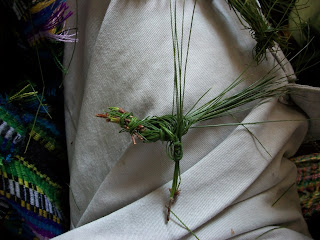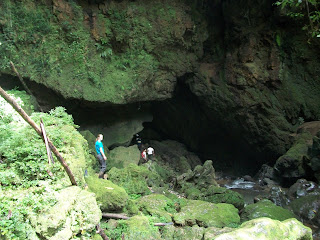I am beginning to develop a weekly routine, which is something
I like. My days are beginning to fly by,
usually an indication that I am enjoying myself, which I would say all in all
is true. I have a 15 minute (about 1 km)
walk from my host family’s home to the school farm. I arrive at the school at 8 to start the
morning. Lately, before I know it, 12pm
has arrived and I head back for lunch.
The afternoons are passing by rapidly too. 5pm arrives soon enough and I return to
the Siquic home to cleanup and have supper.
The first activity of the month was organizing the tool shed
at the farm. This was a great job for
the rainy days in the beginning of November.
I arranged things a bit more conveniently and found tools no one knew
the school had.
One of those finds was an ancient reel mower. It was rusted stiff, but I knocked it with a
hammer and loosened it up. Elias was
standing by watching me and asked what the thing was. “Macquina para cortar grama.” (A machine to cut grass) I said, and pushed
it across the lawn. It worked, but was
still sticking a bit. “Necesita
aceite.” (It needs oil) I said. Elias was ecstatic. He left hurriedly and returned with old motor
oil. He proceeded to drench the mower,
and unfortunately the surrounding lawn, with oil. He got it working fairly well though and is
happily using it around the school. “El
esta jugando.” (He is playing). Oscar
told me when he saw Elias with the mower.
Old rakes make great machete racks!
We have repaired 10 shovels that needed new
handles.
We also have 7 hoes back in
commission with newly selected handles.
I happily selected a long handle for my own hoe. I can now hoe with comfort, since I do not
need to bend my back. I do not
understand why Guatemalans prefer to hunch over while hoeing. It is very uncomfortable in my opinion. They do not understand why I desire a long
and straight handle. So it seems that I
have a hoe all to myself, which is fine with me. Yet, to be sure, I engraved and burned my
name into my hoe handle - just in case.
Making handles is an art.
Doing an engraving job.
I heated a wire in the evening cooking fire and burned my name into the handle. Then I used a candle to seal my engraving with wax.
Just a bit of new owner pride.
The farm now has 12, 5 gallon buckets. Pedro, Oscar and I built a bucket rack to
keep them organized and allow them to dry when wet. They came in a stack and we had quite a time
getting some of them unstock. Pedro, Oscar and I agreed to not stick buckets
inside each other.
Oscar working on the rack.
Oh, the beauty of neatly organized buckets!
One of the first tasks with the newly acquired buckets was
spreading compost. It was much work for
little gain, in my mind. Scaling the
hills was a challenge for me. I need to
repair the stairs down to the gardens.
Part way through the job, I slipped on the step slope and landed in a lemon tree. After that, I left the nimble Guatemalans carry the
buckets back and forth while I filled them.
“Este no es nada.” (This is
nothing) Oscar said and then told me about carrying two full buckets of cement
up ladders during construction of one of the Bezaleel buildings. My hat is off to that guy. Nevertheless, in 3 hours time we only had 100
feet by 3 feet covered. I need to think of
a better system. I bucket chain when the
students are here would work. Or a pulley
system of buckets descending and ascending on a sky-lift like apparatus would
be totally awesome!
One of my dreams for the farm came true this week. I have been noticing the junk metal around
the buildings and finding broken shovels and pick-axes while cleaning out the
tool shed these past few weeks. “It
would be great to sell these to a scrap dealer and use the money to purchase
seed for the farm.” I thought. I was
working on a plan for how to get them to the scrap dealer, when yesterday as I
was about to leave for lunch, a scout from a metal recycler passed by and asked
Oscar if we had any scrap to sell (I had told Pedro and Oscar that morning of
my plan to turn the junk into seed).
Oscar asked me if I wanted to sell it to the guy for 50 cents a
pound. I asked if that was a good price
and Oscar said it was not bad. He tried
talking the guy up to 80 cents a pound, but to no avail. I told them it was better than leaving the
metal sit around and rust away. They
agreed and we all helped to collect the metal strewn about the farmyard. Now 124 pounds of scrap are off the farm and
I have Q 62 to spend on more seed from the local market!
Quite a pile.
We are beginning to seed crops. So far, peas, squash, cilantro, chard and red
beets are in the ground. It will be
exciting to watch them grow!
Dew drops on a cabbage plant.
Planting Guisquil (a tasty squash) with Oscar and Pedro.
Plenty of compost to help them grow.
The first Sunday of the month, I attended the dedication of
a new Mennonite Church at Chicujal. It
was a beautiful Sunday morning and as we marched to the church, the
congregation sang a song in monotone harmony.
It was beautiful.
The church building itself was very nice, cement block and
steel-roof construction, as is common in this locality. The new congregation did not spare the sound
equipment, as typical here among the Kekchi.
They boast sound equipment more advanced than in most of the churches in
my hometown. Why they need such projection
equipment for a 50 by 30 foot building, I do not know. I adjusted my earplugs as the praise team
opened with their first song and tried to focus on worship. This was very hard because even with the
earplugs, the bass rattled my bones. I
am also not particularly fond of the style of music here. The songs sound all the same and it is not because
I do not understand the language. They
are usually in the same key and with the same pulsating rhythm. The lead singer does more wailing than
singing, in my judgment and there is very little congregational participation
in the songs. This is the same trend I have
noticed in many churches in the States. Congregations
are losing the practice of singing. I
believe it is due to the type of music being played. A band does not need audience participation
for the song to be a success. All the
necessities for the song rely on the musicians in the band. Accapella music on the other hand, relies
totally on the audience to make the song a beautiful presentation. What are we losing by adopting sound
equipment and electric instruments?

The boys are in front of the subwoofers...

Anyway, while I was debating this in my mind, two boys, in
the aisle to my right, motioned for my attention. The one plopped a worm made out of the pine
needles on my lap. This is one Kekchi
custom I totally love. For celebrations,
they carpet the floor with pine needles.
It gives a wonderful scent to the event and it is a totally renewable
and biodegradable decoration! Back to
the worm, it was ingeniously created. I
walked it up and down my leg to the enjoyment of the boys. That got my mind turning. I gathered some pine needles and attempted to
make a pine needle doll. Unfortunately,
it practically fell apart when I gave it to the boys, but they were
delighted. I then produced a dragonfly
and rooster. Two little girls behind me
were watching and happily snatched these creations when I offered them. By this time, the boys had made a second worm
and attached the two in the shape of a heart.
This activity brought back memories of all the fun things my brother,
Josef, and I made in the services and church functions we attended. It is so fun to create things and I am glad
to see that some Kekchi boys are flowing with creativity. I hope they keep it up.
Two worms in the shape of a heart and a pretzel.
My creative friends.
Tomorrow, I leave for a bird watching
camping trip with John Cahill. Having
put in four full weeks at the farm, I am ready for a change of scenery and expedition
into the wilderness!





















































